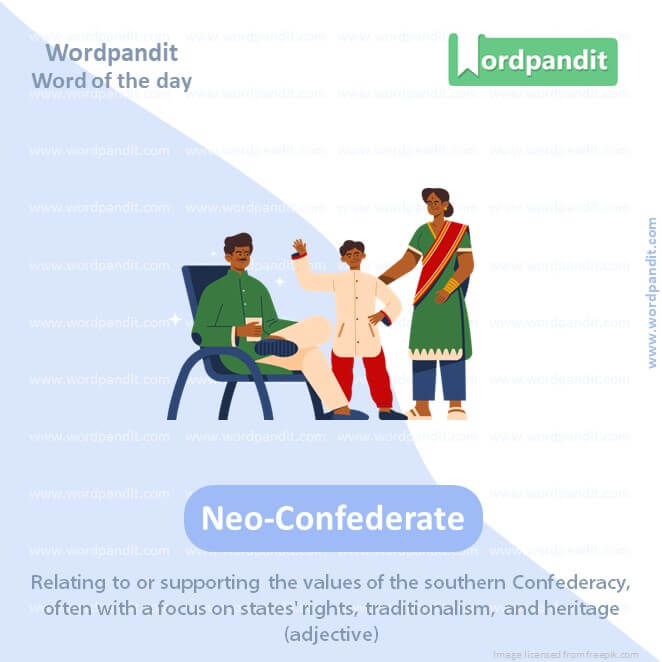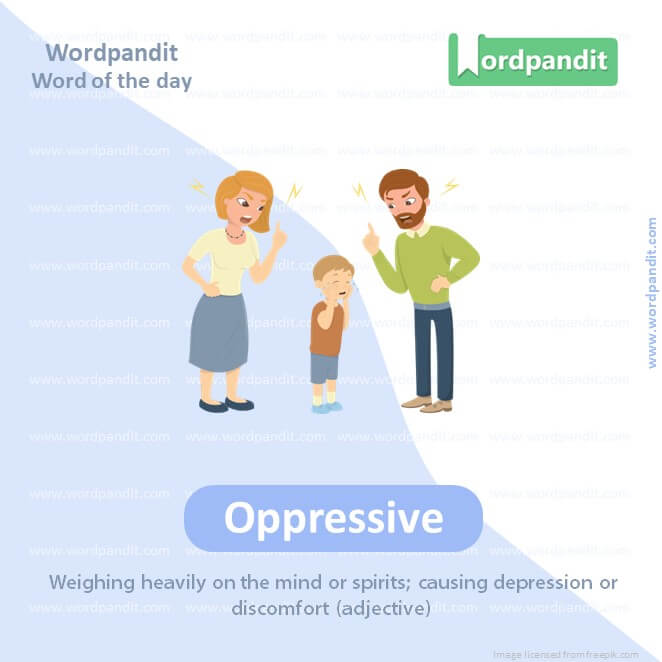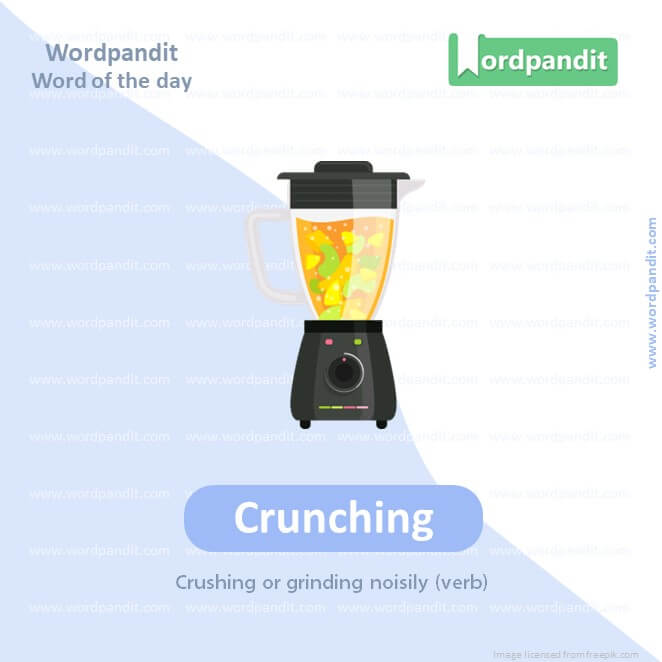Daily Vocabulary Words: List of Daily Used Words in Leading International Newspapers
Hi there. Welcome to this special section @ Wordpandit.
Our endeavour here is very simple: to highlight important daily vocabulary words, which you would come across in leading newspapers in the country. We have included the following newspapers in our selection:
• The New York Times
• The Washington Post
• Scientific American
• BBC
• The Guardian
• Psychology Today
• Wall Street Journal
• The Economist
We are putting in extensive work for developing your vocabulary. All you have got to do is be regular with this section and check out this post on a daily basis. This is your repository of words that are commonly used and essentially, we are posting a list of daily used words. Hence, this has significant practical application as it teaches you words that are used commonly in leading publications mentioned above.
Visit the website daily to learn words from leading international newspapers.

WORD-1: Neo-Confederate
CONTEXT: This is going to lead to a lot of accusations that Haley is some sort of neo-Confederate or slavery apologist, which is tough to align with the fact that in 2015, as South Carolina’s governor, she chose to remove the Confederate battle flag from the statehouse grounds.
SOURCE: Washington post
EXPLANATORY PARAGRAPH: Neo-Confederate is like someone who likes or supports ideas from a long time ago in American history, especially ideas from the southern states during the Civil War. It’s like someone who thinks old ways from the past are good.
MEANING: Relating to or supporting the values of the southern Confederacy, often with a focus on states’ rights, traditionalism, and heritage (adjective).
PRONUNCIATION: nee-oh-kon-fed-er-it
SYNONYMS: Traditionalist, Old South Advocate, Pro-Confederacy
USAGE EXAMPLES:
1. The neo-Confederate group held a rally in the town.
2. He studied neo-Confederate movements in American history.
3. The monument was a symbol of neo-Confederate ideology.
4. There was a debate over the neo-Confederate flag’s meaning.
WORD-2: Insights
CONTEXT: The insights resulting from this data are close to zero; all that is actually revealed is the constant, far-reaching surveillance we are under by big tech, and how dull it is to reduce human experience to numbers.
SOURCE: Guardian
EXPLANATORY PARAGRAPH: Insights are like smart ideas or understanding something really well. It’s like suddenly figuring out how to solve a tricky puzzle.
MEANING: Deep understandings or intuitive perceptions into the true nature of something (noun).
PRONUNCIATION: in-saits
SYNONYMS: Understandings, Realizations, Perceptions, Revelations, Intuitions
USAGE EXAMPLES:
1. Her book provides valuable insights into child psychology.
2. The scientist gained new insights from the experiment.
3. He shared his insights on the market trends.
4. The discussion offered interesting insights into the problem.

WORD-3: Humidifier
CONTEXT: the journalist Julia Reinstein shared a 2023 summary from the company that makes her humidifier.
SOURCE: Guardian
EXPLANATORY PARAGRAPH: A humidifier is a machine that makes the air in a room wetter. It’s like when the air feels too dry, and you use it to make breathing easier and more comfortable.
MEANING: A device that increases humidity (moisture) in a room (noun).
PRONUNCIATION: hyoo-mid-uh-fy-er
SYNONYMS: Moisturizer, Vaporizer, Misting device, Hydrator
USAGE EXAMPLES:
1. She put a humidifier in her room to help with her dry skin.
2. The humidifier helps in reducing static electricity in the house.
3. He used a humidifier to ease his breathing problems.
4. The plants thrived with the addition of a humidifier in the greenhouse.

WORD-4: Righteous
CONTEXT: the Civil War featured one side with a righteous cause and one side with a lost cause that defended a fundamentally evil system.
SOURCE: Washington post
EXPLANATORY PARAGRAPH: Righteous is like being very good and fair. It’s like when someone always does the right thing and helps others.
MEANING: Morally right or justifiable; virtuous (adjective).
PRONUNCIATION: rai-chuhs
SYNONYMS: Virtuous, Moral, Ethical, Upright, Honorable
USAGE EXAMPLES:
1. She felt a righteous anger about the injustice.
2. He was known for his righteous deeds.
3. They took a righteous stand against the unfair rules.
4. The righteous person is often respected in the community.
WORD-5: Superficial
CONTEXT: It’s the friendly face of consumer tracking: superficial insights from the masses of data these companies have compiled, written up in a perky tone and heavily padded with “engaging” design.
SOURCE: Guardian
EXPLANATORY PARAGRAPH: Superficial is like only caring about the things you can see on the outside, not the deep or important parts. It’s like judging a book just by its cover without knowing the story inside.
MEANING: Existing or occurring at the surface; not thorough, deep, or complete (adjective).
PRONUNCIATION: soo-per-fish-ul
SYNONYMS: Shallow, Surface-level, Skin-deep, External, Insubstantial
USAGE EXAMPLES:
1. The wound was only superficial.
2. He had a superficial understanding of the topic.
3. Their friendship was superficial, lacking real depth.
4. The book provides only a superficial analysis of the issue.

WORD-6: Oppressive
CONTEXT: At the same time, for many others in South Carolina, the flag is a deeply offensive symbol of a brutally oppressive past.
SOURCE: Washington post
EXPLANATORY PARAGRAPH: Oppressive is like when something is really heavy or hard to deal with. It’s like when it’s too hot and the air feels heavy, making it hard to breathe or play.
MEANING: Weighing heavily on the mind or spirits; causing depression or discomfort (adjective).
PRONUNCIATION: uh-pres-iv
SYNONYMS: Burdensome, Harsh, Restrictive, Tyrannical, Overbearing
USAGE EXAMPLES:
1. The oppressive heat made it difficult to work outside.
2. They lived under an oppressive regime.
3. The oppressive rules stifled creativity.
4. She felt an oppressive sadness in the room.

WORD-7: Crunching
CONTEXT: Every tech company from Monzo to my bank is crunching my data.
SOURCE: Guardian
EXPLANATORY PARAGRAPH: Crunching is like breaking something hard into smaller pieces with a loud noise. It’s like when you step on dry leaves and they make a “crunch” sound.
MEANING: Crushing or grinding noisily (verb).
PRONUNCIATION: kruhn-ching
SYNONYMS: Crushing, Grinding, Chomping, Mashing, Squashing
USAGE EXAMPLES:
1. She enjoyed the crunching sound of the gravel under her shoes.
2. He was crunching on a carrot.
3. The machine was crunching the recycled bottles.
4. They heard the crunching of leaves as someone approached.
WORD-8: Self-inflicted
CONTEXT: She must be hoping for a better outcome from this self-inflicted wound.
SOURCE: Washington post
EXPLANATORY PARAGRAPH: Self-inflicted is like when you cause something to happen to yourself. It’s like when you accidentally hurt yourself while playing.
MEANING: Caused by oneself; done to oneself intentionally (adjective).
PRONUNCIATION: self-in-flik-tid
SYNONYMS: Self-caused, Self-imposed, Self-induced, Self-produced, Voluntary
USAGE EXAMPLES:
1. The injury was self-inflicted.
2. He was dealing with self-inflicted financial problems.
3. The team’s loss was largely self-inflicted.
4. She suffered from self-inflicted stress.
WORD-9: Creeping
CONTEXT: But over the past half-decade or so, there has been a creeping, unmistakable shift in how we approach these informal annual reviews.
SOURCE: Guardian
EXPLANATORY PARAGRAPH: Creeping is like moving slowly and quietly, close to the ground. It’s like when you try to sneak up on someone without them seeing you.
MEANING: Moving slowly and quietly close to the ground; gradually advancing (verb).
PRONUNCIATION: kree-ping
SYNONYMS: Crawling, Sneaking, Slithering, Sliding, Skulking
USAGE EXAMPLES:
1. Ivy was creeping up the side of the house.
2. He felt a creeping sense of dread.
3. The cat was creeping towards its prey.
4. A creeping vine covered the old fence.
WORD-10: Romanticized
CONTEXT: Haley wanted to remove the flag but also never wanted to antagonize those who romanticized the Confederate cause.
SOURCE: Washington post
EXPLANATORY PARAGRAPH: Romanticized is like making something seem better or more exciting than it really is. It’s like imagining a fairy tale version of a normal story.
MEANING: Made to seem better or more appealing than it really is (verb).
PRONUNCIATION: ro-man-tuh-syzd
SYNONYMS: Idealized, Glorified, Embellished, Exaggerated, Beautified
USAGE EXAMPLES:
1. The movie romanticized the life of pirates.
2. She romanticized the past, forgetting its hardships.
3. The novel romanticized rural life.
4. There’s a tendency to romanticize the early years of their relationship.
Vocabulary list
In navigating the seas of language learning, a ‘vocabulary list’ can often be a dependable guiding star. These collections of words serve as a focused learning tool, yet the technique of mastering a ‘vocabulary list’ effectively requires more than simple perusal. It calls for a smart, sustained approach that amalgamates understanding, memory, and application.
Exploring a ‘vocabulary list’ should be more than a one-way trip. It ought to be more like a round trip, wherein you learn the words, come back to review them, and then set out again for a new voyage. This repeated interactive way of exploring the ‘vocabulary list’ aids in solid memory retention and effective learning.
Next, while dealing with a ‘vocabulary list’, employing memory-boosting techniques can bolster your retention substantially. Here, mechanisms like spaced repetition systems and flashcards can simplify and streamline the process. Moreover, associating words on your ‘vocabulary list’ with visual cues or personal stories can help your brain make strong connections, strengthening your recall ability.
However, the most crucial aspect of learning from a ‘vocabulary list’ is active application. Conquering a list without using the words in real-world contexts might leave you with fleeting knowledge. Hence, make it a point to integrate these learnt words into your daily interactions, be it on social media, in email exchanges, or casual conversations. The regular utilization reinforces your understanding and brings the ‘vocabulary list’ to life.
Conclusively, the ‘vocabulary list’ is a treasure trove in a language learner’s quest, waiting to be unlocked strategically. Through the trinity of review, memory-enhancing techniques, and active application, one can master any ‘vocabulary list’. So, take charge of your learning journey and set sail with your ‘vocabulary list’, charting the vast and fascinating seas of language.











